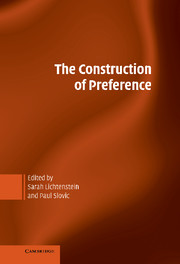Book contents
- Frontmatter
- Contents
- Contributors
- Preface
- Acknowledgments
- I INTRODUCTION
- II PREFERENCE REVERSALS
- III PSYCHOLOGICAL THEORIES OF PREFERENCE REVERSALS
- IV EVIDENCE FOR PREFERENCE CONSTRUCTION
- 12 Construction of Preferences by Constraint Satisfaction
- 13 “Coherent Arbitrariness”: Stable Demand Curves Without Stable Preferences
- 14 Tom Sawyer and the Construction of Value
- 15 When Web Pages Influence Choice: Effects of Visual Primes on Experts and Novices
- 16 When Choice Is Demotivating: Can One Desire Too Much of a Good Thing?
- V THEORIES OF PREFERENCE CONSTRUCTION
- VI AFFECT AND REASON
- VII MISWANTING
- VIII CONTINGENT VALUATION
- IX PREFERENCE MANAGEMENT
- References
- Index
12 - Construction of Preferences by Constraint Satisfaction
Published online by Cambridge University Press: 05 June 2012
- Frontmatter
- Contents
- Contributors
- Preface
- Acknowledgments
- I INTRODUCTION
- II PREFERENCE REVERSALS
- III PSYCHOLOGICAL THEORIES OF PREFERENCE REVERSALS
- IV EVIDENCE FOR PREFERENCE CONSTRUCTION
- 12 Construction of Preferences by Constraint Satisfaction
- 13 “Coherent Arbitrariness”: Stable Demand Curves Without Stable Preferences
- 14 Tom Sawyer and the Construction of Value
- 15 When Web Pages Influence Choice: Effects of Visual Primes on Experts and Novices
- 16 When Choice Is Demotivating: Can One Desire Too Much of a Good Thing?
- V THEORIES OF PREFERENCE CONSTRUCTION
- VI AFFECT AND REASON
- VII MISWANTING
- VIII CONTINGENT VALUATION
- IX PREFERENCE MANAGEMENT
- References
- Index
Summary
A central tenet of classical theories of rational choice is that people harbor a stable, well-defined, and discernable order of preferences, and have computational skills that enable them to choose the courses of action that maximize their preferences. A paradigmatic example of a classical theory is multiattribute decision theory, which prescribes that the utility of a choice is equivalent to the sum of its preferences, that is, the sum of the weighted values of its attributes (Edwards & Newman, 1982; Keeney & Raiffa, 1976).
Research has challenged the axiom of preference invariance. Rather than being stable, well- defined, and discernable, preferences have been shown to be constructed (Markman, Zhang, & Moreau, 2000; Slovic, 1995); to some degree, they are labile, reversible, and obscure (for a review, see Payne, Bettman, & Johnson, 1992). Preference invariance is violated under different descriptions of essentially the same options (Tversky & Kahneman, 1986), when different modes of elicitation are invoked (Lichtenstein & Slovic, 1971), and when options are presented in different contexts (Shafir, Simonson, & Tversky, 1993). Various process theories claim that preferences are reconstructed to create dominance and thus bring the decision task to a point of commitment (Janis & Mann, 1977; Montgomery, 1983; Svenson, 1992; for a review, see Brownstein, 2003). These process theories are inconsistent with cognitive dissonance theory, which posits that changes in preferences are exclusively a postcommitment phenomenon (see Festinger, 1964, p. 153; also Simon & Holyoak, 2002).
Information
- Type
- Chapter
- Information
- The Construction of Preference , pp. 235 - 245Publisher: Cambridge University PressPrint publication year: 2006
